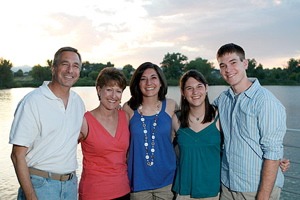
John Buechner wants to open Colorado’s first aftercare safe home for girls rescued from sexual exploitation. All he has to do is raise enough money to build (or buy) it, find the right professionals to staff it and get licensed by the state to operate it.
His research suggests direct care will cost $4,000 per month per girl. John’s newly formed religious non-profit, The Mercy Project Colorado, hopes to have enough room for eight to 10 girls. That’s $32,000-$40,000 per month, not including facility costs.
So far, he’s raised a total of $12,000 and been promised a horse for equestrian therapy.
“I’m a glass half-empty kind of a guy,” laughs John, a part-time teaching pastor at Pinewood Springs Community Church.
Yet he’s moving forward with his vision for a safe house, because he’s become convinced of the reality of commercial sexual exploitation, not only overseas in places like Thailand and Cambodia, but also right here in the United States.
According to a Nov. 8, 2010, press release from the FBI, Operation Cross Country V, a three-day nationwide sting that was part of the Innocence Lost National Initiative, led to the recovery of 69 children who were being victimized through prostitution. Since its inception in 2006, Innocents Lost Task Forces and Working Groups have recovered more than 1,200 children “from the streets.” More recently, a Feb. 17 report from KTRK news in Houston confirmed the arrests of 10 people accused of forcing nine women and girls into sexual slavery.
In its January 2007 report (referenced here), the State of Colorado’s Human Trafficking Task Force confirmed that sexual trafficking is a problem in Colorado, too. The proximity of Denver International Airport (DIA), the world’s 10th busiest airport, and the intersection of the I-25 and I-70 highways, make the Denver metro area a prime thoroughfare for traffickers.
The challenge John and other anti-trafficking activists face in raising awareness of commercial sexual exploitation is two-pronged. One, it’s often intertwined with things like the drug trade and prostitution, and doesn’t seem at first glance to fit the stereotypical definition of slavery, and two, it’s difficult to get ordinary people to acknowledge that they live in the same country, state, or even city as slaves.
“It’s hard to fathom,” John says. “People don’t want to hear about it. They don’t realize that this doesn’t only happen in ‘less civilized’ places. It happens here, too.”
“People say, ‘[Working on social causes] is only for people like Bono and Mother Teresa. I’m just hanging on trying to keep my job.”

John admits he himself hasn’t always been concerned about ending sexual exploitation. It wasn’t until after he enrolled in a class at Denver Seminary that he began to consider the plight of orphans, and then more specifically, girls being sexually trafficked.
“It just seemed like everywhere I went I would hear about it. At church. In class, my professor would say, “Pray for my friend who’s adopting.” I kept thinking, ‘Well, that’s nice, but it doesn’t have anything to do with me.’”
Eventually, John laid out a fleece of sorts, asking to hear an “audible” voice if God wanted him to pursue getting personally involved. Right after that resolution, John tuned his radio to 850 KOA, a popular news talk station in Denver, and the first thing he heard was an advertisement for a theatrical performance of the musical Annie.
The more John and his wife, Lori, learned about the reality of sex trafficking the more they were sold on getting involved. One of the first things John did was pursue what he thought would be an ideal position with the humanitarian non-profit Compassion International, based in Colorado Springs, Colo. When he learned he was one of only three candidates for the job, he thought the job would be his. That is, until he experienced an uncharacteristic problem during his interview.
“It was one of those where you meet a hundred people in a day. And I had a bloody nose for the whole day. At the end, the woman in charge of hiring said, ‘I heard you’ve had a rough day.’…Then she said, “Actually, we’ve met all three of you, and we’re not going to hire any of you. I don’t think we’re going to fill this position.”
It wasn’t until John discovered that survivors of sexual trafficking often have no safe place to go for restoration and rehabilitation that The Mercy Project Colorado was born. Lori’s full-time job as the director of library services for Jefferson Academy High School enables John to pour his efforts into fundraising, speaking, inviting speakers like Theresa Flores, author of The Slave Across the Street to come to Colorado, and coordinating events like the recent Valentine’s Day “Dance for Hope” sponsored by the University of Colorado’s Students Against Modern-Day Slavery (SAMS). As a pastor with experience working with youth and as the father of three college-aged kids, John hopes to help integrate the passion of young activists with the resources of the older generation in order to see a Colorado safe house become a reality.
“We just want to help these girls have a different life,” John says. “If we’re able to just help one, I’d say it would be worth it.”
Currently, there is at least one other group attempting to raise funds for a shelter for sex trafficking survivors in Colorado. According to John, there are only four safe houses in the entire United States, not because of a lack of need, but because it’s so difficult to find a location for them and to sustainably fund them.
For now, John is hoping The Mercy Project’s first $12,000 multiplies enough to buy some land, create a safe place for trafficking survivors, and add an appropriate number of human professionals to the lone equine staff member they’ve been promised.
To volunteer your resources or learn more about John’s efforts with The Mercy Project Colorado, visit www.mercyprojectcolorado.org.


